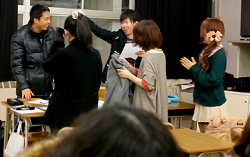Advantages of working in groups
Management, social psychology, and education literature contain volumes of writings and research on the possible advantages of working in groups. Ludwig Von Bertalanffy (1969) proposed that individuals interacting within a group have the potential to reach synergy, meaning that the whole can be greater than the sum of the parts. Applied to group dynamics, this means that a group of interdependent individuals has the potential to accomplish more than they could accomplish on their own. Other advantages to working in groups include the following:
- Individuals can become more productive during group activities than in activities they do on their own.
- Working in a group can enhance individual development and satisfaction over working alone.
- Groups can consider problems from more perspectives, allowing them to make more creative decisions than individuals.
- Group learning in college classrooms around the world
Learn more quickly
Specifically related to the benefits of group learning in classroom settings, Jane Abercrombie (1959) observed that medical students learned more quickly and accurately when collaborating with small groups than when working alone. This suggests that learning is an interdependent process, not an individual process.
Perform better
Similarly, observing groups of remedial students at the University of California Berkeley, Uri Treisman (1985; 1992) hypothesized that students who interacted with other students performed better academically. In his research, Treisman found that collaboration is so essential to learning that many individuals cannot succeed without it. In addition, he discovered that remedial students can significantly increase performance and satisfaction through collaboration with others. Treisman (1992) concluded that individual students could enhance success by joining learning groups based on shared interests and common goals (p. 368).
Universities worldwide use small-group learning methods to enhance student performance and satisfaction. For example, at the University of Phoenix, students join learning teams in which the individuals work to develop their teams, the teams work to develop each team member, and each team helps to teach the other groups in the class (University of Phoenix, 2004).





![Your brain can keep growing, adapting, and learning at any age, if you are willing to put in the effort [Image: Copilot]](/images/Images/best-years-for-adult-brain300.png)
